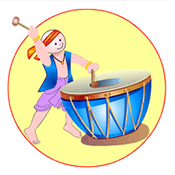
Dimdima
Online Children's Magazine from India

Dimdima
Online Children's Magazine from India

Birds that eat only fish or algae are found only in areas which have water bodies’ near them. The birds in these areas have long legs to protect their upper bodies from water. Such birds are called stilts. They have long beaks to catch fish. Some of them have holes in their beak to let out water after catching fish or after eating algae. Long birds can bend their neck in U shape to eat algae from the water. Few of these birds have oil glands to dry their body. The birds that do not have oil glands, spread their wings and then dry them in the sunshine. Such birds are called cormorant.
Some of the water birds migrate from faraway lands and come to areas near Pune. Birds such as flamingo come from Rann of Kutch and settle in Bhigwan. Some other birds such as storks, ibises, ducks, teals, etc come in areas such as Kawdi, Khadwasla Dam, Mulshi Dam, Bhigwan, etc. Some birds such as the Siberian crane come from Siberia to Bharatpur to save themselves from the cold winds in their areas. The largest bird found in India is Sarus Crane which is also a water bird.
But now these birds are decreasing in number because of their beautiful feathers, their meat, water pollution, etc. The tribes living near water bodies eat the flesh of these birds. The birds are killed for their beautiful feathers to make their houses more beautiful. The most important reason for the decrease in number of these birds is water pollution. The factories let out most of their waste in the lake. The fishes in these lakes get infected and when the birds eat these infected fishes they die.
Deep Dehadray
7th C
Vikhe Patil Memorial School
DOLA SHINDE
Very Good Article.
EXPLORE MORE...
Dimdima is the Sanskrit word for ‘drumbeat’. In olden days, victory in battle was heralded by the beat of drums or any important news to be conveyed to the people used to be accompanied with drumbeats.
Bharatiya Vidya Bhavan
K. M Munshi Marg,
Chowpatty, Mumbai - 400 007
email : editor@dimdima.com
Bharatiya Vidya Bhavan
505, Sane Guruji Marg,
Tardeo, Mumbai - 400 034
email : promo@dimdima.com
Dimdima.com, the Children's Website of Bharatiya Vidya Bhavan launched in 2000 and came out with a Printed version of Dimdima Magazine in 2004. At present the Printed Version have more than 35,000 subscribers from India and Abroad.